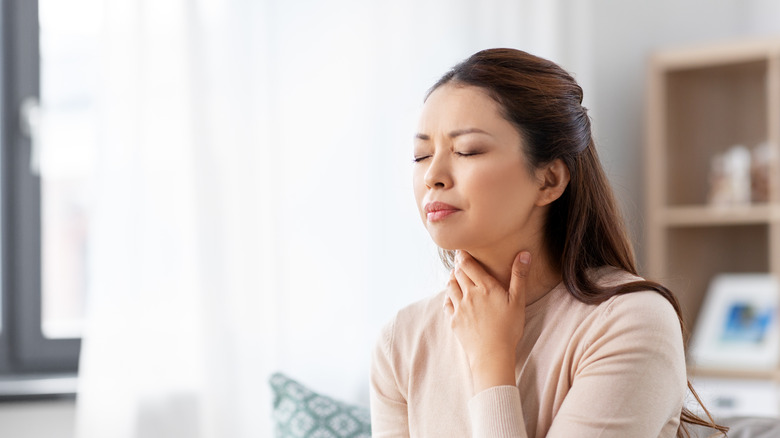How To Treat Mono At Home
Often called the "kissing disease" because it is transferred by saliva, mononucleosis can also be passed through the sharing of a glass or silverware (via Mayo Clinic). Caused by the Epstein-Barr virus and usually just called "mono", it has an incubation period of four to six weeks, and causes a variety of unpleasant symptoms including fatigue, fever, sore throat, skin rash, headache, swollen lymph nodes and tonsils, and in some cases, a swollen spleen.
People usually start to feel better after a week or two, and it's important to call your doctor if this isn't the case for you, or if you experience difficulty breathing, persistent high fevers, severe headache, jaundice, difficulty swallowing, or sharp pain under the left chest (per American Academy of Family Physicians). Lightheadedness, confusion, blurred vision, fainting, and weakness in the arms or legs are other red flags that could point to complications.
For most people, however, treating mono at home is relatively simple and they should be back to normal in no time. Here are some tips and techniques for getting over mono quicker in the comfort of your own home.
Getting over mono with home remedies
Since there is no vaccine or cure for mono, and standard antiviral medications do not work against the virus, staying home and healing is the option that most people with mono will face (via The Cleveland Clinic). Getting lots of rest and staying hydrated are the two keys to beating mono, so make sure to get full nights of sleep, take plenty of naps, and drink lots of water and tea.
Besides rest and drinking fluids, there are some home remedies that may help you get well faster and ease some of the symptoms of mononucleosis. According to Williams College, gargling with salt water may help you relieve some of the pain and discomfort associated with mono, such as sore throat. Lozenges, hard candy, and frozen desserts can also be helpful, and pain medications such as acetaminophen or ibuprofen can be used to reduce pain and fever. However, people under the age of 19 should avoid aspirin, as it may lead to Reye's syndrome.


